The 5 Different Types of VPN and Their Protocols

Arsalan Rathore
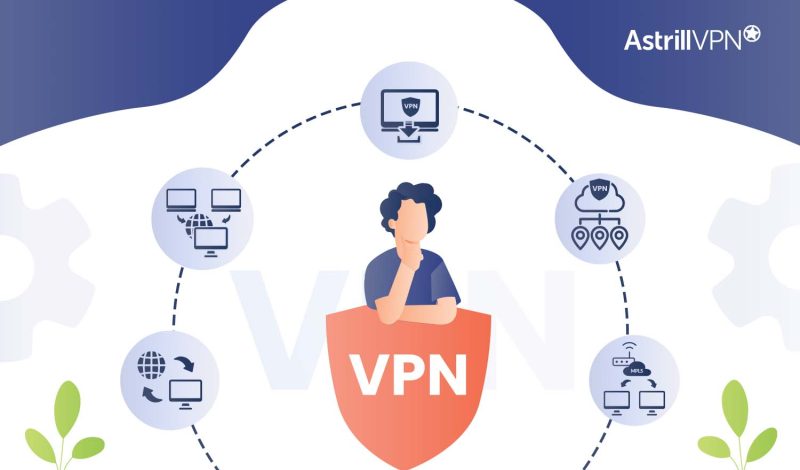
Originally, VPNs were developed for businesses but they soon became popular and more of a necessity for every netizen around the globe. VPN technology offers secure, cost-effective, and flexible solutions to safeguard corporate networks. VPNs grant employees access to work tools and data by utilizing an encrypted tunnel over the open internet while restricting unauthorized entry.
This encryption is a barrier against potential threats lurking within the public internet environment. While VPN setups and tunneling protocols may seem dauntingly technical, they provide essential options for businesses to secure their networks effectively.
Follow this guide to learn more about the types of VPNs and the different types of VPN protocols.
Table of Contents
5 Different types of VPNs and when to use them?
Different types of VPNs cater to varying needs. Selecting the right VPN type depends on remote access requirements, network scalability, and security needs. Following are the different types of VPNs:
1. Remote Access VPN
A remote access VPN allows individual users to connect to a corporate network securely from remote locations. It establishes an encrypted tunnel between the user’s device and the corporate network, providing access to internal resources such as files, applications, and intranet services. ARemote Access VPN enables employees working remotely or traveling to access company resources securely.
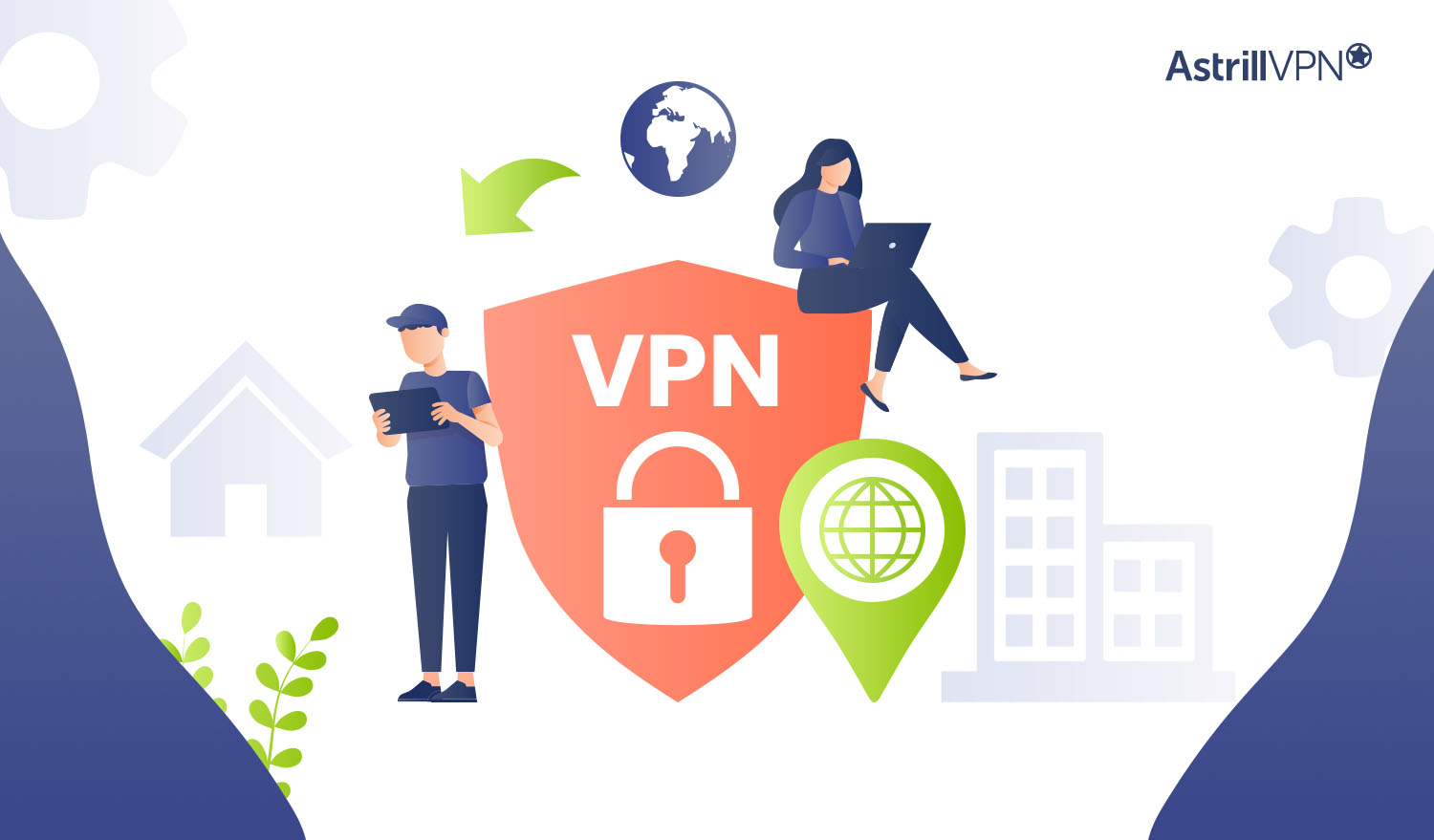
How It’s Implemented
Remote Access VPNs are typically implemented using client software installed on the user’s device, establishing a secure connection to a VPN server within the corporate network. The VPN server authenticates the user’s credentials and encrypts data traffic between the user’s device and the corporate network.
Once connected, users can access internal resources securely as if they were physically present within the corporate network. Remote Access VPNs may utilize various authentication methods such as username/password, digital certificates, or multi-factor authentication to verify user identities and ensure secure access.
Remote Access VPN Use Cases
- Remote Access VPNs enable employees to work from home or other remote locations while securely accessing corporate resources.
- Employees who frequently travel or work outside the office can use Remote Access VPNs to maintain productivity and access necessary resources.
- Temporary or external users, such as contractors or business partners, can securely access specific resources or applications through Remote Access VPNs without compromising network security.
2. Site-to-site VPN
A Site-to-site VPN, or router-to-router VPN, connects multiple networks in different locations securely over the internet. It establishes encrypted tunnels between network gateways or routers, allowing seamless communication between the connected networks. The primary purpose of a Site-to-site VPN is to enable secure data transmission and resource sharing between geographically dispersed locations.
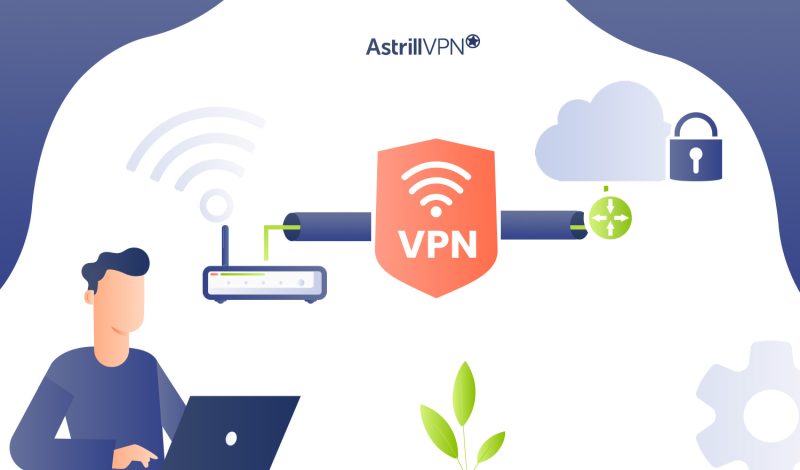
How It’s Implemented
Site-to-site VPNs are typically implemented using VPN-enabled routers or gateway devices deployed at each network location. These devices establish encrypted tunnels between them, creating a secure online communication channel.
Site-to-site VPNs allow seamless communication between connected networks, enabling data transmission and resource sharing while maintaining data confidentiality and integrity. Organizations may employ additional security measures, like firewall rules and access controls, to enhance network security.
Site-to-site VPN VPN Use Cases
- Site-to-site VPNs are used by businesses with multiple branch offices or remote sites to establish secure communication and share resources such as files, applications, and databases.
- Organizations with distributed data centers or cloud infrastructure use Site-to-site VPNs to ensure secure connectivity and data replication between data center locations.
- Site-to-site VPNs facilitate secure communication and collaboration between partner networks or third-party organizations, allowing them to share resources and information securely.
3. Client-Based VPN
A Client-Based VPN, or software VPN, is installed on individual devices such as laptops, desktops, or mobile devices. It enables users to establish secure connections to a VPN server or network infrastructure, providing safe access to internal resources from remote locations or public networks. A Client-Based VPN ensures secure remote access for individual users.
AstrillVPN is a type of client-based VPN because to use it, you have to install its app for your device and then you’re able to establish the connection to one of its servers.
How It’s Implemented
Client-based VPNs require installing VPN client software on the user’s device and establishing a secure connection to a VPN server or network infrastructure. The VPN client authenticates the user’s credentials and encrypts data traffic between the device and the VPN server.
Users can securely access internal resources or browse the internet while their data traffic is encrypted and protected from eavesdropping or interception. Client-based VPNs may offer features such as automatic connection on startup, split tunneling, and kill switch functionality to enhance user experience and security.
Client-Based VPN Use Cases
- Client-based VPNs are used by employees working remotely or traveling to securely access company resources such as files, applications, and intranet services.
- Individuals concerned about online privacy and security use Client-Based VPNs to encrypt their internet traffic and protect their data from unauthorized access or surveillance.
- Users looking to access region-restricted content or services use Client-Based VPNs to mask their IP address and appear to be browsing from a different location.
4. Cloud VPN
A Cloud VPN, or a Virtual Private Cloud (VPC) VPN, provides secure connectivity between an organization’s on-premises network and cloud infrastructure. It enables seamless integration and communication between on-premises resources and cloud services hosted on Amazon Web Services (AWS), Microsoft Azure, or Google Cloud Platform (GCP).
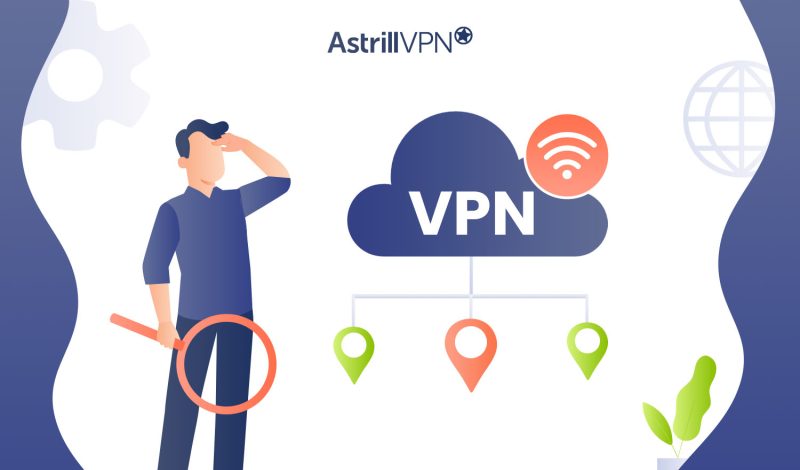
How It’s Implemented
Cloud VPNs are typically implemented using VPN gateway services provided by cloud service providers. These services allow organizations to configure VPN connections between their on-premises network devices and virtual private cloud networks within the cloud environment.
These VPNs establish encrypted tunnels between on-premises and cloud environments, enabling secure communication and data exchange. Organizations can manage and monitor VPN connections through cloud management consoles, ensuring their hybrid cloud infrastructure’s high availability, performance, and security.
Cloud VPN VPN Use Cases
- Organizations adopting a hybrid cloud model use Cloud VPNs to establish secure connections between their on-premises infrastructure and cloud environments, enabling seamless data migration, resource scaling, and workload distribution.
- Businesses leveraging multiple cloud providers for diverse workloads or services use Cloud VPNs to ensure consistent connectivity and data exchange between cloud platforms.
5. MPLS VPN
MPLS (Multiprotocol Label Switching) VPN is a type of VPN that utilizes MPLS technology to transmit data between geographically dispersed locations securely. It establishes virtual private networks over service provider networks, enabling organizations to prioritize traffic, ensure quality of service (QoS), and achieve high levels of security and reliability.
How It’s Implemented
MPLS VPNs are implemented by service providers using MPLS technology within their network infrastructure. Organizations subscribe to MPLS VPN services provided by these carriers, which involve configuring VPN connectivity and Quality of Service (QoS) parameters.
They offer traffic prioritization, bandwidth management, and service-level agreements (SLAs) to ensure reliable and predictable network performance. Organizations can monitor and manage their MPLS VPN connections through service provider portals or network management systems, ensuring optimal performance and adherence to service level agreements.
MPLS VPN Use Cases
- Large enterprises with multiple branch offices or remote locations utilize MPLS VPNs to establish secure and reliable wide-area network (WAN) connections.
- Organizations requiring low-latency and high-quality communication services, such as voice and video conferencing, benefit from MPLS VPNs.
- Businesses with stringent performance and reliability requirements for mission-critical applications, such as financial transactions or healthcare systems, rely on MPLS VPNs.
Commercial VPNs
Commercial VPNs are subscription-based services offered by providers to general users who want to secure their online activities and access the internet without restrictions. Unlike enterprise-focused VPNs, which are designed for internal corporate use, commercial VPNs are tailored to individuals seeking privacy, anonymity, and freedom from geo-restrictions. They encrypt internet traffic, safeguard users on public Wi-Fi networks, and allow access to content from different regions worldwide.
How It’s Implemented
Commercial VPNs are implemented through third-party providers who maintain global networks of VPN servers. Users subscribe to the service and install dedicated applications on their devices, such as computers, smartphones, or routers. Once connected, internet traffic is encrypted and routed through the provider’s secure servers. Providers often include DNS leak protection, split tunneling, and ad blocking to enhance user security and browsing performance.
Commercial VPN Use Cases
- Individuals who want to protect their privacy and prevent internet service providers, advertisers, or hackers from monitoring their activity.
- Travelers or residents in countries with internet censorship who want to bypass restrictions and access the global internet freely.
- Streaming users who wish to unlock region-specific content libraries across platforms.
- Everyday users who want secure browsing when connected to public Wi-Fi hotspots
Mobile VPNs
Mobile VPNs are designed for users who frequently switch between networks, such as moving from Wi-Fi to cellular data. Unlike traditional VPNs that may drop the connection during a network change, mobile VPNs maintain a seamless and secure session even when the underlying network changes. This makes them ideal for users who require constant connectivity on smartphones, tablets, or mobile workstations.
How It’s Implemented
Mobile VPNs are implemented using specialized protocols allowing session persistence and automatic reconnection. Service providers configure these VPNs to adapt to fluctuating network conditions without disrupting the secure tunnel. Users install mobile VPN software or apps, managing the secure session across varying connections. This ensures that the user remains connected securely, regardless of network transitions or temporary drops in coverage.
Mobile VPN Use Cases
- Professionals who rely on secure and continuous access to corporate applications while traveling.
- Emergency services, such as police, fire, and medical teams, require uninterrupted connectivity in the field.
- Remote workers who move between different Wi-Fi networks must maintain secure access to company resources.
- Everyday users who want uninterrupted VPN protection while switching between mobile data and Wi-Fi.
Double VPNs
Double VPNs, or multi-hop VPNs, route internet traffic through two VPN servers instead of just one. This creates an additional layer of encryption and enhances anonymity by making it significantly more difficult for anyone to trace the connection’s origin. By masking the IP address twice, Double VPNs offer higher privacy than standard VPN setups.
How It’s Implemented
Double VPNs are implemented by configuring the VPN service to pass user traffic through two servers in different regions. The first server encrypts the data and assigns a new IP address, while the second server applies another layer of encryption and routes the traffic onward. Users typically enable this feature directly through their VPN application, where the provider has set up specific server pairs for double-hop connections.
Double VPN Use Cases
- Users who prioritize maximum anonymity and want to reduce the chances of their online activities being tracked.
- Journalists, activists, or individuals working in restrictive environments who require extra protection for sensitive communications.
- Security-conscious professionals who handle confidential data and want to minimize exposure to surveillance.
- Users are looking to add safeguards against data leaks or interception.
Intranet VPNs
Intranet VPNs are designed for organizations that want to connect multiple office locations or remote employees securely within a private internal network. They create a secure communication channel across the Internet, allowing employees to access internal resources, applications, and databases as if they were directly connected to the company’s local network. This makes intranet VPNs vital for businesses that prioritize security, efficiency, and collaboration across different geographic locations.
How It’s Implemented
Intranet VPNs are implemented by setting up secure tunnels between a company’s various branch offices or between remote employees and the main office network. Organizations often use dedicated VPN gateways, firewalls, or routers to establish and manage these connections. The configuration ensures that sensitive internal data remains encrypted and accessible only to authorized users. Network administrators oversee these connections and enforce access controls to protect company resources.
Intranet VPN Use Cases
- Large enterprises with multiple branch offices need secure internal resources and applications access.
- Companies with remote employees who require safe and reliable connectivity to internal systems.
- Businesses that want to improve collaboration across teams located in different geographic areas.
- Organizations that handle sensitive data, such as financial institutions or healthcare providers, must ensure compliance with data protection regulations.
Extranet VPNs
Organizations use extranet VPNs to extend secure network access to trusted external partners, vendors, or clients. Unlike intranet VPNs, which are limited to internal employees and branch offices, extranet VPNs allow external stakeholders to connect to specific parts of a company’s network without exposing the entire system. This controlled access fosters collaboration while maintaining strong security measures.
How It’s Implemented
Extranet VPNs are implemented by configuring secure tunnels between the organization’s network and the external partner’s network or device. Network administrators carefully define permissions and access controls to ensure that only the necessary applications, files, or resources are available to external users. These VPNs often use authentication mechanisms and encryption protocols to safeguard sensitive data while limiting access to non-essential areas of the company’s infrastructure.
Extranet VPN Use Cases
- Businesses collaborate with suppliers or vendors that need limited access to internal systems.
- Organizations working closely with clients who require secure entry to specific project-related resources.
- Joint ventures where two or more companies share access to a secure environment for ongoing operations.
- Companies in industries like manufacturing, healthcare, or finance that rely on external partners for critical workflows, while ensuring data confide
Most common VPN protocols
Following are the different types of VPN connections or protocols that are usually used by VPNs:
Internet Protocol Security (IPSec)
IPSec is a suite of protocols that provides a high level of security for internet communications. It works by authenticating and encrypting each IP packet of a communication session. Operating at the network layer (Layer 3) of the OSI model, IPSec can be used in various modes, including transport mode and tunnel mode.
IPSec is widely used for site-to-site and remote access VPNs due to its robust security features, ensuring confidentiality, integrity, and authenticity of data transmitted over the network. It is commonly deployed in enterprise VPN setups to establish secure connections between branch offices, data centers, and remote users. IPSec is also utilized in Virtual Private LAN Service (VPLS) implementations for secure communication between geographically dispersed networks.
Layer 2 Tunneling Protocol (L2TP)
L2TP is a protocol used for creating VPN tunnels over IP networks. It works by encapsulating PPP frames within IP packets at the data link layer (Layer 2) of the OSI model. L2TP is often used with IPSec for added security.
This protocol is commonly used in remote access VPN scenarios, allowing users to connect securely to a corporate network from remote locations using standard VPN client software. It is also utilized when there is a need for compatibility with older VPN technologies or network infrastructure.
L2TP is a reliable and secure solution for legacy systems or devices that require VPN connectivity. Using L2TP, organizations can establish a secure connection between remote locations and their corporate network, ensuring that sensitive data is protected.
Point–to–Point Tunneling Protocol (PPTP)
PPTP is a protocol used for creating VPN connections over IP networks. It operates at the data link layer (Layer 2) of the OSI model and is known for being simple and easy to set up.
Initially developed as a VPN protocol to provide secure remote access to corporate networks, PPTP offers basic encryption and authentication mechanisms to safeguard data transmitted over the VPN connection.
However, PPTP has been largely deprecated due to its security vulnerabilities. While it is still used in some environments that require compatibility with legacy systems or devices, it is not recommended for modern VPN deployments because of its susceptibility to security attacks.
SSL and TLS
SSL (Secure Sockets Layer) and its successor TLS (Transport Layer Security) are cryptographic protocols used to secure communication over the internet. They operate at the OSI model’s transport layer (Layer 4) and are commonly used to secure web browsing, email, and other internet-based services.
The combination of these protocols provides encryption and authentication mechanisms to ensure the confidentiality, integrity, and authenticity of data transmitted between client and server applications. They are widely used in VPN deployments to create secure VPN tunnels over the internet.
SSL and TLS VPNs are commonly used for remote access VPNs, allowing users to securely connect to a corporate network from any internet-enabled device using a standard web browser. They are also utilized in SSL VPN gateways for secure access to web-based applications and resources.
OpenVPN
OpenVPN is an open-source VPN protocol that utilizes SSL/TLS protocols for secure communication. It operates at the application layer (Layer 7) of the OSI model and is known for its flexibility, security, and cross-platform compatibility.
It provides a robust and customizable VPN solution for creating secure tunnels over the internet or other IP-based networks. It supports various encryption algorithms and authentication methods, making it suitable for multiple VPN deployments. The best thing about AstrillVPN is that you can configure the OpenVPN protocol through a single click from its app without following the lengthy process.
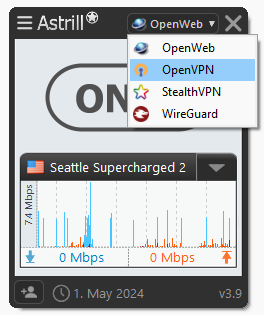
OpenVPN is widely used in enterprise VPN deployments for remote access and site-to-site connectivity. It is favored for its security features, ease of configuration, and support for diverse network environments.
Wireguard
Wireguard is a modern and lightweight VPN protocol that offers a faster, simpler, and more secure alternative to traditional VPN protocols. It operates at the network layer (Layer 3) of the OSI model, making VPN performance and usability much better.
It is an efficient and streamlined VPN protocol that creates secure tunnels over the internet or other IP-based networks. It employs cryptographic techniques to ensure data confidentiality, integrity, and authenticity.
The Wireguard protocol is gaining popularity in commercial and open-source VPN deployments due to its simplicity, performance, and security benefits. It is especially well-suited for resource-constrained environments such as embedded systems, IoT devices, and mobile platforms. Wireguard is natively supported in the Linux kernel and has clients for other operating systems.
You can easily find the Wireguard protocol in AstrillVPN’s app and switch to it through a single click.
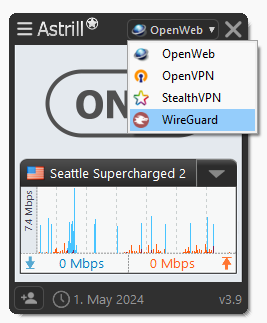
AstrillVPN’s Wireguard protocol works best without being disrupted by network transitions. It’ll keep you secured throughout the time you’re connected to it.
Factors to Consider When Choosing a VPN Type and Protocol
When selecting a VPN type and protocol, several factors must be carefully considered to ensure the chosen solution meets the organization’s security, performance, compatibility, ease of use, scalability, and management requirements.
Security
Encryption Strength:
Encryption strength is critical in ensuring the confidentiality and integrity of data transmitted over the VPN. Robust encryption algorithms such as AES (Advanced Encryption Standard) with 256-bit keys offer strong protection against unauthorized access and data interception.
AstrillVPN offers military-grade AES 256-bit encryption and employs robust security protocols to safeguard sensitive information from cyber threats.
B. Performance
1. Speed:
VPN performance directly impacts user experience and productivity, particularly for bandwidth-intensive applications like video streaming or large file transfers. VPN speed factors include network latency, encryption overhead, and server load.
2. Bandwidth:
Bandwidth availability is crucial for supporting data transmission over the VPN, especially in environments with high data volume or concurrent user connections. Not every VPN has the capacity to provide their users unlimited bandwidth but AstrillVPN does. With AstrillVPN, users enjoy unlimited bandwidth, regardless of the protocol, so they can stream or browse without any hassle.
C. Compatibility and Ease of Use
1. Device and Cross-Platform Compatibility
Compatibility with a wide range of devices and operating systems is essential for ensuring seamless connectivity and accessibility across various platforms. Cross-platform compatibility allows users to access the VPN from different devices and operating systems without encountering compatibility issues. AstrillVPN has apps for all major platforms, including Windows, MacOS, iOS, Android, and routers.
2. User Interface:
An intuitive and user-friendly interface enhances the usability of VPN solutions and reduces the learning curve for end users. AstrillVPN’s user interface is user-friendly; you can find configuration on the front, and you won’t have to navigate various menus.
Which VPN protocol is the best for your business?
This question is subjective to the nature of your business because VPNs aren’t a one-size-fits-all solution. You will have to weigh the options and analyze the cyber threats you may encounter, which VPN will suit you, and also see your usage and which VPN fits the profile.
FAQs
The strongest type of VPN typically depends on factors such as encryption strength and security protocols. VPNs employing robust encryption algorithms like AES-256 and strong authentication methods are generally considered the most secure.
Yes, paid VPN services often offer faster and more reliable connection speeds compared to free VPNs. Paid VPNs typically invest in better infrastructure and resources to ensure optimal performance for their users.
VPNs are legal in most countries, but their legality can vary depending on local laws and regulations. It’s essential to review the specific legal requirements and restrictions in your jurisdiction before using a VPN.
VPNs can provide a secure way to encrypt and protect data transmitted over networks, making them safe for most users.
VPNs are used by various individuals and organizations, including remote workers, travelers, businesses, government agencies, journalists, activists, and individuals concerned about online privacy and security.
A VPN is not a firewall, although they serve different purposes. A firewall is a network security device that monitors and controls incoming and outgoing network traffic based on predetermined security rules. Whereas, a VPN creates a secure, encrypted connection over a public network (such as the Internet) to ensure data privacy and confidentiality.


No comments were posted yet